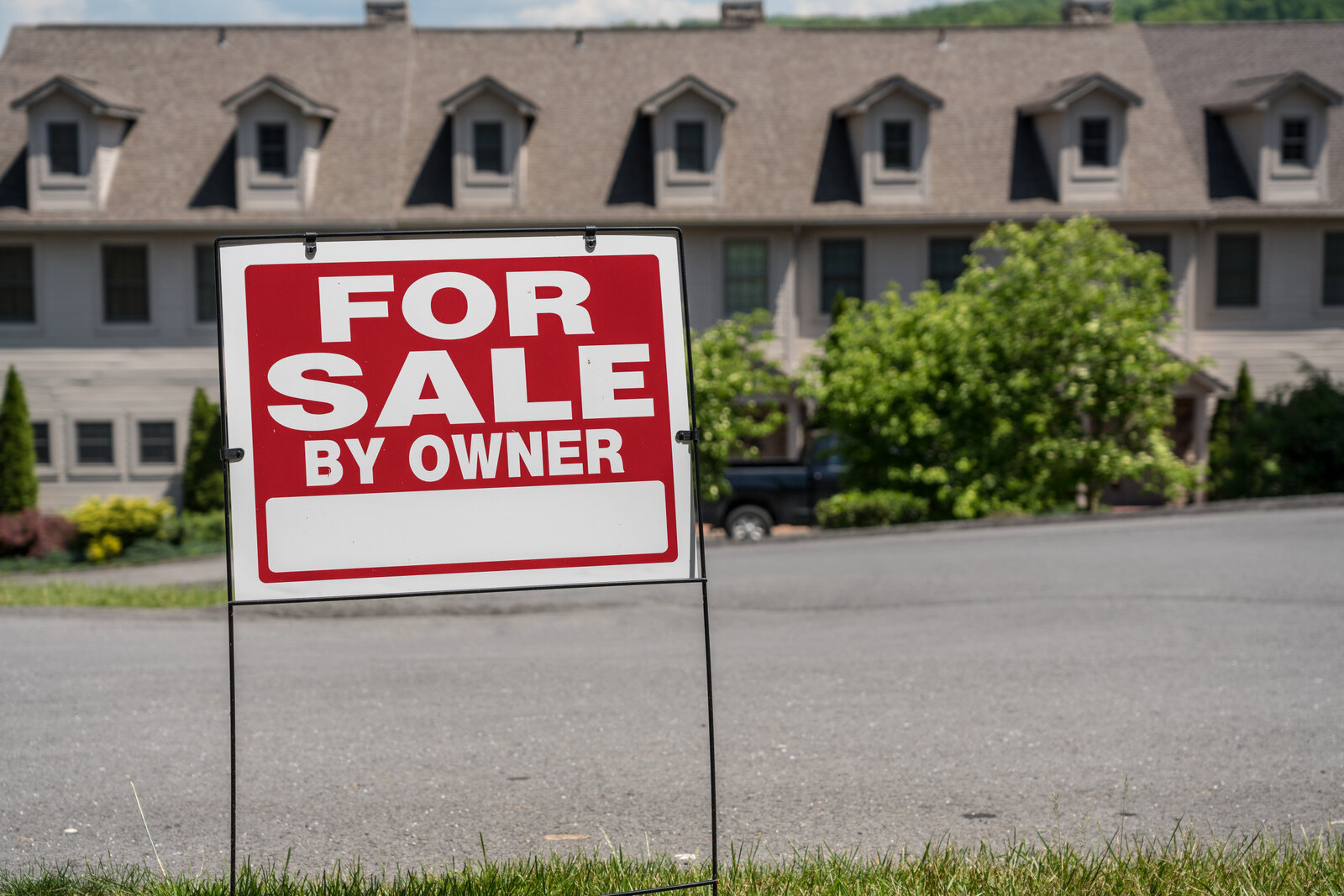The Definitive Guide To Selling Your House Yourself
In the U.S., roughly 9 out of 10 homeowners opt to use a real estate broker to sell their home for them. Thus, only about 1 in 10 homeowners will sell their house on their own. There are several reasons why the vast majority of homeowners leave the selling to a third party:
- Real estate is complicated. Navigating the marketing, advertising, showings, offers, negotiations, paperwork, mortgages, inspections, repairs, closings and more is a daunting task, especially if you don’t have a great understanding of real estate laws and requirements for selling a property. Plus, all of these activities take time–time you may not have.
- Advertising properties is difficult without access to the Multiple Listing Service (MLS). The MLS is where agents list or advertise their properties. Unless you are an agent or working with an agent, you can’t advertise your property here. Most real estate websites get their listings from the MLS, so if your house isn’t advertised in MLS, it will not be seen by the average buyer. We’ll discuss ways around this later.
- Sales through a broker tend to get higher sales prices. Purely due to the much larger exposure properties receive by being listed on MLS, those homes will likely draw more offers and higher offers. Professional agents also know how to price properties correctly, and their sales expertise can help improve the final price.
So, why sell your house without a Realtor?
- Save the real estate commission. Your Realtor is going to charge commission rates of 5 to 6% on average to sell your house. While this may not sound like much, if you are selling a $500,000 house, the Realtor commission would be $25,000 to $30,000, a substantial amount for most people.
- You control the selling process. Any time you sell a house, things can get messy. Interruptions for multiple home showings, inspections, negotiations and other demands on your time can be stressful and disruptive. Part of the problem comes from the fact that third parties—agents—are involved. By selling your house yourself, you take control, remove the element of the third party agent, and set your own schedule.
- You control what you do with your house. Any time you involve an agent, they will want to present your home according to what they believe are the best practices. However, you may not want to follow their recommendations. So, while an agent may insist that you make certain repairs, or stage the house a certain way, if you sell it yourself, you don’t have to do anything you don’t want to do.
- Sell your house faster. FSBO properties tend to sell faster, according to some surveys. The increased speed may be due to the removal of a layer (the agent) of “bureaucracy” but in all likelihood this is due to the next reason you might want to sell without a Realtor…
- You are selling your house to a friend or family member. A large number of FSBO sales are between parties who know each other. In this case, an agent is probably not necessary to complete a sale.
Pick The Best Time to Sell
Set Your Price – Check it Twice!

Professional Appraiser
If you need help from a professional, you can pay to have a professional appraisal performed on your home. This will cost $300+, but may be worth it if you find out your home should be priced a few thousand dollars higher than you thought.
Real Estate Agents Often Get a Higher Price

One Important Note About Avoiding Agent Commissions
Prepare Your Home
Clean

Here are some simple steps to take:.
- Deep clean. Clean the windows, clean the carpets (not just vacuum), vacuum and sweep the floors, scrub bathroom and other tile, clean the toilets, vacuum or wash the vents, dust the molding above doors and other openings, change air filters, scrub the tubs and sinks. Take a hard look, from the perspective of a buyer, not from someone who has lived in the house for years. Would you buy the house as it looks now?
- Remove clutter and personal items. You want to make countertops and other surfaces mostly clear of stuff. This is much more inviting and less distracting to prospective owners. Take down photos of you, your family and friends. Remove junk on the floors. Organize closets so they can be viewed. Don’t fill them up with the junk that you are trying to hide.
- Put excess items in boxes and store them neatly out of sight. If you have a basement or attic, relocate items there, and make sure if someone wants to see that part of the house, you won’t be embarrassed to show it. If you have an excessive amount of things (junk?), consider renting a storage unit and temporarily relocating your stuff there. You want your house to look bigger, and you can achieve this by removing the clutter and excess items.
- Reduce the amount of furniture. If you have too much furniture crammed into your house, prospective buyers may not be able to see parts of rooms. By removing furniture, rooms will become accessible and visible and the house will look bigger.
- Consider hiring a stager to bring in furniture and decorations. If the house is sitting empty, it may be helpful to have a stager bring in furniture so that buyers can visualize the house with beautiful furniture and decorations.
- Brighten up the place. Make sure all the lights have working light bulbs. Open blinds, shades and curtains to let the natural light in.
- Protect your valuables. Remove or hide jewelry, money, medications, personal papers and other items that could be tempting or easily stolen. Secure them either in a non-moveable safe or secret hiding spot, or entrust those items to a friend you trust while you are showing the house.
Sell with Curb Appeal

Here’s what you can do to get a high curb appeal:
- Mow the yard.
- Edge the driveway and walkways.
- Touch up flower beds with pine straw, bark or whatever covering you use.
- Clean out the gutters.
- Pressure wash or chemically clean the driveway. Driveways can become dirty and faded over time, but we often don’t notice because it happens gradually. This may be a task you want to farm out since it requires specialized equipment. If pressure washing, use an attachment that spreads out the water so you don’t end up with small marks from the nozzle all over the driveway.
- Pressure wash the house. Dirt and mildew accumulate on the exterior of homes. Pressure washing will make the paint look brighter and make it last longer as well.
- Pressure wash the roof. Look closely at the roof to see if it needs cleaning. All kinds of junk can accumulate on a roof, from dirt to leaves to growing moss and more. Stains can develop over time from weathering. Clean it if necessary.
- Remove items from the yard like garden figurines, toys, tools, flags, personal items, etc.
- Trim the bushes. Smaller bushes tend to make a house look better and newer because brand new houses have brand new (and small) bushes. This is a bit of a subliminal way to make your house look and feel new.
- Plant some colorful flowers in a highly visible location.
- Paint any problem areas. If you have some small patches that don’t look right, consider touching up those areas.
- Paint the front door. You can paint a door in a matter of minutes and for just a few dollars’ worth of paint. If the paint on your front door has faded, you may be shocked at just how much better your house will look. Your buyer’s first up-close impression of the house will probably be the front door, so make sure it is a good one.
Maintain Your Home
Here are a few things to do to keep your house clean and ready for showings:
- Vacuum at least weekly. More often if you have pets.
- Dust.
- Clean toilet bowls.
- Keep clutter off counters.
- Touch up prior to each showing.
- Keep the yard mowed and bushes neatly trimmed.
Market Your Home
Get Professional Photos

Write a Quality Listing
Post the Listing
MLS
Make a For Sale By Owner Site
Post on Other Sites
Social Media
In Your Neighborhood
Signage

On the sign, write or print whatever is appropriate for your situation. At a minimum, include your phone number. Other words you might want to put on the sign include:
- “Call or text” or just “Call” or “Text” — If possible, post a number that is textable, so buyers who are more comfortable texting you can do so.
- “By Appointment Only” or “By Appt Only” — If you have a problem with curious buyers dropping by unannounced, add this wording.
- “Agents Welcome” or “Agents Protected” — If you are willing to pay a commission to a buyer’s agent make sure they know they can bring clients to you and be compensated for it.
- “No Agents” — If you do not want to work with real estate agents or don’t want to pay a commission to them, make that clear. Just be aware that most buyers are working with agents, and they may have signed a contract with an agent, and they may not be able to buy a FSBO house without their agent receiving compensation.
Prepare Sales Material
Prepare Records and Information
Show Your Home
Be Professional
Because nine out of ten homes are sold by real estate professionals, there is a higher level of expectation of professionalism when buyers conduct their search for a home. You need to treat this as a serious endeavor. You are selling something that is probably your most valuable asset, so why wouldn’t you?
- Expect to receive calls from agents. Even though you are selling FSBO, buyer’s agents will still contact you, and they will ask for a commission.
- Agents may be reluctant to work with you because they assume you know nothing about selling real estate, which will make the transaction more difficult to complete. So, work hard to earn their trust.
- Answer calls and texts at any time and any day. That is the expectation today’s buyers and their agents have.
- Return voicemails and emails promptly.
- Offer flexible showing times and be ready for impromptu showings. FSBO signs tend to invite buyers to stop and ring the doorbell more so than an agent’s sign. Prospects know where the “agent” (you) lives and they assume you are the person with the answers, and they will assume you are ready to show the home at any time.
- Treat buyers with respect, even if they do not extend the same to you.
- Consider the use of a lockbox. Agents are accustomed to accessing homes through a lockbox, either electronic or mechanical. With a lockbox, you can give access to buyers and agents while you are not at home. If you are not comfortable letting strangers in without an agent, you may want to only give lockbox access to buyers with agents.
Before a Prospect Arrives
You should do a little prepping to make the house presentable.
- Let your family members, if any, know a showing is imminent. Make a plan for what those family members will do during the showing. Will they leave, stay in a particular room, go in the backyard?
- Secure pets. While you love your pets, your prospect does not. Some people do not like animals and if your pet is running wild during a showing, this could kill a sale. Plan where you will sequester your pets during the showing.
- Clean and declutter as described above.
- Turn on lights and ceiling fans.
- Open blinds, shades and curtains to let in light.
- Open doors where appropriate to showcase important areas.
- Close toilets.
- Make sure the indoor temperature is pleasant. Adjust the thermostat if necessary.
- Avoid foul odors. Try to keep strong smelling food odors to a minimum. Avoid the use of strong deodorizers as well since some people may be sensitive to these and they may make people suspicious that you are trying to cover up something like a mold smell. Some candles give off comforting scents, but choose wisely and don’t overuse them. Baking cookies or other foods can yield pleasant odors that evoke the “smells of home” and help improve your home’s ambiance. Citrus has been found to be especially effective at improving the perception of a home’s value. Don’t mix odors. Pick one.
- Provide refreshments. Make some beverages and simple snacks (like those cookies you just baked) available to your guests. “Breaking bread” together has a way of making people feel more comfortable so they can let their guard down.
- If appropriate, start a fire in the fireplace.
- Light a few unscented candles and place them throughout the house.
- Prepare and print a sign-in sheet.
The Actual Showing
Hold an Open House

Open houses give buyers a chance to drop by without needing to make an appointment. You set a period of time during which you will be in your house and make it available for showing. An open house can generate some interest and excitement, but you need to do a few things to generate that excitement:
- Advertise it. You can post ads on Craigslist, Facebook and other social media, your neighborhood site and more.
- Reach out to agents. If you are willing to work with buyer’s agents, seek out agents who specialize in your area and let them know your house is available and invite them to your open house. Watch for flyers and postcards in your mail from local agents. Locate for sale signs in your area and contact those agents. Even if they don’t have a client to bring with them, they may have an interest in seeing your property so they can tell pool of buyers about it. These agents may be good options if you eventually decide to list the house with an agent.
- Post signs. Get an “Open House” sign. Put the date and time of the open house on the sign so people can plan to be there. Put the sign out several days in advance of the actual date. On the day of the sale, consider getting some helium balloons and attaching them to your mailbox or the sign itself so people know the open house is underway.
- Be professional. It goes without saying that you should treat the open house just like an agent would. Be welcoming and courteous and make your visitors feel like you know what you are doing. You want buyers to know that a For Sale By Owner sale would be as easy as a sale through an agent.
- Provide snacks. Make simple snacks and drinks available in the kitchen or dining area. This will help visitors feel more welcome and comfortable.
- Print sales sheets. Make sure you have plenty of sales sheets with details about your house. You want people to have information about the house and a way to contact you after the open house.
- Create an alternative video walk-through. If you have buyers who are reluctant to come to an open house because of Covid concerns or for other reasons, consider making a video walk-through of your house. If your photographer also made a video, then you are all set. However, you can quickly do a walk-through yourself with your cell phone. Just start at the front door and walk around the house. You can narrate as you go. Sharing the video is simple. You can post the video free on YouTube, Facebook and other video sharing sites.
Sales Follow-Up
Be Willing to Adjust the Price
Receive Offers
Negotiate
The negotiation process involves the back-and-forth exchange of offers and counteroffers. It’s really the make-or-break stage of the entire sale process. Get it right and you sell your house. Get it wrong and your prospective buyer is lost forever. Here are tips to make sure you negotiate effectively.
- Negotiate in writing. When you sell a house using a real estate agent, it’s unlikely that you will have any verbal discussion with the buyer, much less any verbal negotiations. However, since you are selling your house yourself, you may be tempted to negotiate with your buyer verbally. Simple discussions are ok, but true offers must be in writing. Real estate contracts, by law, must be in writing. Offers and counteroffers should be in writing. Don’t rely on a verbal discussion of the details. A buyer should prepare their offer in a document. The document may be called “Offer to Purchase Real Estate” or “Purchase and Sale Agreement” or something similar. You can accept the offer, or you can make changes and send it back to the buyer. The document can go back and forth until an agreement or an impasse is reached. One important note: Today, the majority of documents exchanged between parties are electronic. Scanned documents and electronically signed documents are legal to use in real estate transactions. You may need some way to scan documents and exchange them with other parties. Sites like Docusign.com offer paid services that let you easily exchange documents and sign them for legally binding agreements.
- Keep emotion out of the negotiations as much as possible. When you sell a house using a real estate agent, they stand as a barrier as well as a conduit through which all negotiations flow. This can help to remove some of the more emotional moments. However, if you are negotiating directly with the buyer, and especially if it is in person or on the phone, you must be careful to not let emotion enter into the process. If a buyer makes a remark that insults your kitchen, for example, don’t take it personally. If they make you an insultingly low offer, don’t take it personally. For some buyers, this may be a tactic to see just how low you are willing to go. In spite of any insults, you should always send a counteroffer, at what you consider to be a reasonable price. Keep a professional, business attitude and you will come out on top.
- Have an attorney review purchase agreement. Because you don’t have an experienced real estate agent working on your behalf, this may be an appropriate time to hire a real estate attorney to review your contract. Yes, it will cost money, but if there are mistakes in the contract, an attorney will spot those quickly and correct them, possibly saving you thousands of dollars.
- State and Federal disclosures may be required. You need to include any legally required disclosures. If you don’t know what may be required, now is the time to hire that lawyer!
- Accept the offer. If, after all the offers and counteroffers, you receive a purchase agreement you can accept, you would send the signed offer back without any further changes. Or the buyer could accept a counter offer from you, as well.
- Earnest money. A purchase agreement is typically accompanied by earnest money. The earnest money is usually held by a third-party such as an escrow agent like a title company or a closing attorney. The buyer may send this directly to the agent, rather than to you, as a way to protect their interests. This is a common practice.
Due Diligence Period
Here are the typical task you’ll need to perform or facilitate during the due diligence period and through closing.
- Handle contingencies properly. After the contract is signed and approved by both parties, you still need to make sure any contingencies are accommodated and handled appropriately. For example, if a home inspection is required within a certain number of days, be sure to allow the inspector to have access to the house.
- Follow up with the buyer to make sure their mortgage approval is moving forward. Because this loan approval is critical to the sale, keep a close watch on this. The last thing you want is to find out three weeks later that your buyer hasn’t done anything to get their loan approved.
- Do your part. Are there other things you agreed to do in the contract? Be sure to get them done as soon as possible. Make any repairs you agreed to make. Assist with any other access the buyer may need to complete their duties before the closing.
- Prepare to move out. According to the terms of your agreement, you’ll need to be out of the house by a certain date. Begin now to get moved out by that time. Usually, the seller is out of the house by the closing date, if not sooner, so the clock is ticking.

Close
Alternatives to (or Variations of) FSBO
iBuyers
iBuyers will probably not be interested in properties that are severely damaged or in need of major renovations or major repairs. They buy properties and quickly sell them to hungry buyers who are looking for move-in ready homes. They aren’t in the business to do major work on a house.
Professional Homebuyers
A professional homebuyer is another viable alternative for selling your house. This type of buyer is often a local real estate investor. They have their own funds and can buy quickly, sometimes in as little as 7 days. They also will buy houses that need major repairs and that have been heavily damaged. Resideum is a professional homebuyer and we would love to make you an offer on your house. Complete this form and we will provide a free offer.
Consider Listing With an Agent
Summary
Here’s a quick summary of the steps to take:
- Decide if the pros and cons of selling a house yourself tilt to the “sell it yourself” side. Most people choose to sell their house by hiring an agent because of the many advantages and in spite of the commission they will pay. If you like doing things yourself and want to save the real estate agent commission, then give it your best shot.
- Set the right price. You need to analyze recent sales in your area and set a competitive price for your house.
- Clean your house thoroughly inside and out.
- Market your house as much as possible on all the available venues, both paid and free. Write a thorough listing. Use quality photos. Get a good for sale sign for your yard.
- Show your house to interested prospects. Show it in its best possible light. Be sure to get names and contact info for your prospects. Hold an open house.
- Follow up with your prospects and ask them to submit offers.
- Avoid unqualified buyers by requiring a pre-approval letter when buyers submit their offers.
- Negotiate effectively, and have your contracts reviewed by an attorney if necessary.
- Due diligence. Once you reach an agreement, be sure to meet all the terms of the contract and make sure your buyer is doing their part to secure financing and the rest of the due diligence, inspections, etc.
- Review the closing documents prior to closing.
- Close the sale and collect your payment!
Finally, consider your alternatives including listing with an agent, selling to iBuyers or to a professional homebuyer.
You CAN sell a house yourself. It can be daunting because it is not something most people do everyday, but if you follow a plan, you can sell your house yourself!
Consult an attorney or an appropriate real estate or financial advisor if you need help with a real estate transaction.
Get A Cash Offer for Your House
Get More Info On Options To Sell Your Home…
Selling your house these days can be confusing and challenging. Connect with us or give us your info below and we’ll help guide you through your options.

